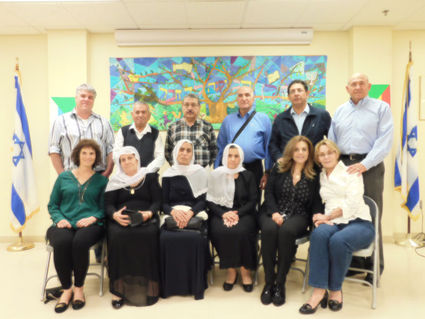Druze sacrifices in service to Israel

Kimberly Newton
Sitting (l-r): Miriam Argov, Salma Zaidan, Johara Madah, Fatma Asaad, Sanaa Halabi, Ronit Eyal. Standing (l-r): Uri Argov, Kamal Zaidan, Talal Madah, Munir Asaad, Dr. Ramzi Halabi, Victor Eyal.
By Caleb R. Newton
Families from the Druze community of Israel came to the Jewish Academy of Orlando late after Shabbat on April 16, to share their stories of loved ones who died while serving in the Israel Defense Force throughout the past decades in several different conflicts.
The families wanted to share their experiences with Central Florida to help build bridges between our communities and to recognize the bridges that are already present.
"This...demonstrates the high level of partnership between the Israeli Druze Community and the Israeli Jewish people," said Victor Eyal, organizer of the event. This partnership extends to the Jewish community of Florida as well.
Not only were personal stories shared, but Dr. Ramzi Halabi, former mayor of northern Israel's Druze town Daliyat al-Karmel, also shared some of the history and culture of the Druze communities in Israel and elsewhere in the Middle East.
He named a few keys to understanding such culture, according to Halabi: Two of the most basic principles are the secrecy of the Druze religion, and the tendency to settle on high places. Deeper into the Druze culture, there are a few more important tenets, according to the former mayor. These include the religious belief in reincarnation and preordained destiny according to God's plan.
Out of these beliefs, the Druze have a strong sense of the need to protect one's clan and to be peacemakers. They live their lives according to making the most peace possible with the world. To them, it is much more than the immediately visible and tangible. According to Halabi, the context for this peacemaking for Israeli Druze is the state of Israel. They see themselves fully as Israelis.
And it is in this context that the rest of the visiting Druze shared their stories. They had all, including Halabi, lost a family member in the service of the state and people of Israel.
Kamal Zaidan, who served in the IDF for decades, lost two sons-Fuah and Saleh, who wanted to follow in their father's footsteps of service. His wife, who was also present, lost her brother, Saleh Hamdan.
Fuah Zaidan was killed while protecting visitors to the city of Bethlehem during Christmas decades ago.
Saleh was killed defending his commander from a terror attack during the Lebanon War. The incident reached the news in Israel before Zaidan knew that the casualty was his son. Zaidan had tried to dissuade Saleh from going to the front in the aftermath of the passing of his elder brother, but to no avail. Zaidan said, through an emotional translation by Eyal, that neither he nor the rest of the family could "convince themselves that this was not what he was supposed to do."
Monir Assad, who served for 35 years in the Israeli border police, lost his brother, Samir, as a prisoner of war to terrorists in Lebanon in the 1980s. The process, though, was dragged out by the terrorists for almost a dozen years, as they pretended that Samir was alive for awhile. They then claimed that an Israeli airstrike was responsible for his death. Israeli government officials assured the Assads that this was not true, and he was in fact killed soon after his capture. It took a long process, however, to retrieve his body. In the end, the Israelis exchanged a living terrorist and two terrorists' bodies for the body of Samir Assad.
In explaining his reason for hosting this event and others like it, Eyal stated, "Ronit [Eyal] and I were looking to do 'something' for Israel's defense efforts, for a while. During the 2014 'Protective Edge' operation we were taken by daily losses of our soldiers and decided to do that 'something' in the form of treating parents of the IDF soldiers who gave their lives during their service in the IDF." The Eyals decided to opened their home to the families of deceased Israeli soldiers. They host the parents at their home in groups of four couples per visit. Each visit lasts a week. Uri and Miriam Argov of Tourico Holdings, have been providing all transportation from Israel and back, tickets to local attractions, and caring for the guests' trips after their stay here, normally for another week, to other places in the U.S."
The Druze families who visited would like to "express their deep gratitude" to the Central Florida Israeli and Jewish community for hosting them and sharing in the telling of their stories.
Caleb R. Newton is a global affairs analyst living in Central Florida and the founder of Global News Breakdown. Find him at Bipartisan Report, Dissecting Society, and the Times of Israel. Contact him at calebrnewton@globalnewsbreakdown.com.







Reader Comments(0)